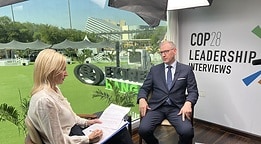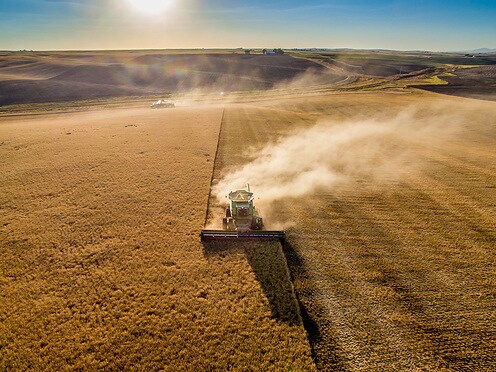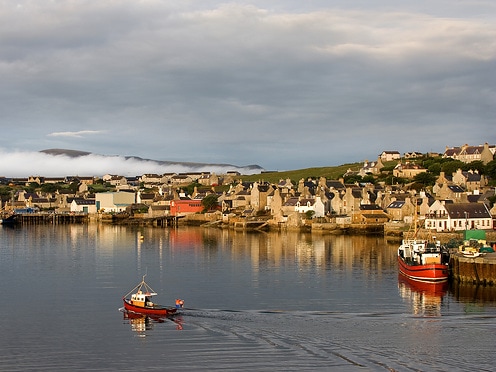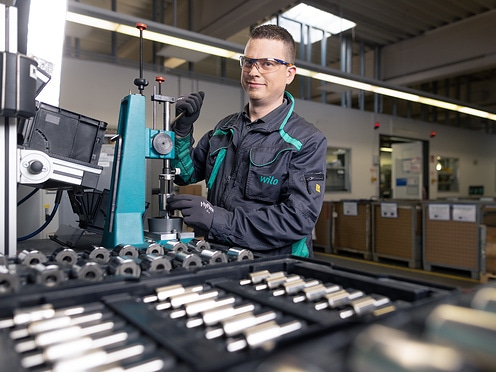"The climate crisis is a water crisis”
COP28 Leadership Interview with Georg Weber, Member of the Executive Board and CTO of the Wilo Group.
Water covers more than 70 per cent of our planet. Yet the global resources of drinking water are limited: just three per cent of the earth’s water is potable. As climate change is increasingly restricting access to this scarce resource every day, our mission is to protect this fundamental human right and to ensure a reliable water supply for people all around the world. During COP28 in Dubai, Laura Buckwell interviewed Georg Weber, Member of the Executive Board and CTO of the Wilo Group, for the COP28 Leadership Interviews. There he described how we are working for a more sustainable future, how water defines our everyday lives, and which projects we are implementing for the sustainable use of this vital resource. Read the transcript or watch the interview here.
Buckwell: Climate change is impacting water resources and rising temperatures are disrupting the entire water cycle. The Wilo Group is a leading provider of pumps and pump systems, which are moving water in an intelligent, efficient and climate friendly manner. The company’s mission is to invent and manage sustainable water solutions that benefit everyone everywhere. I sat down at the COP 28 talks here in Dubai to talk to the CTO of the Wilo Group, Georg Weber.
So, we are here at COP 28. Welcome to Dubai. What are your first impressions?
Weber: It is amazing to see the space here. It is amazing to see the effort but also amazing to hear that 70,000 people are coming here. It really is a fantastic event. And, for us, of course, it is great to be here and have discussions with people who are interested in sustainability.
Buckwell: What is the main reason you are here? What drew you here?
Weber: Well, we are present in the region anyway. Here in Dubai, we have an excellent operation and a big team taking care of the MENA (Editor’s note: Middle East and North Africa) region. With our presence here, we are pursuing different objectives. First, networking, getting to know people who are participating in the fight against water scarcity and work for saving energy and food security. But we are also trying to have discussions with politicians, with NGOs, with partners because we need to cooperate and only then we can really improve the world.
Buckwell: Tell us a little bit more about your role as CTO of Wilo.
Weber: I am heading the R&D (Editor’s note: Research & Development) activities. I am heading the industrial activities, operations, and supply chain logistics. But I am also happily playing the role of an ambassador, often sponsor for sustainability within the Wilo Group.
'We move water in the most efficient way you can think of. Our engineers are striving for the highest possible efficiency levels.'


Georg Weber, Member of the Executive Board and CTO of the Wilo Group, in conversation with Laura Buckwell at COP28.
Buckwell: So, your mission, as I was reading, is to invent sustainable water management solutions. Tell us more in detail about exactly what you do.
Weber: Well, we move water, the vital medium water and we do that in the most efficient way you can think of. So, our pumps are the most efficient pumps in the world. This is what we strive for. Our engineers are striving for the highest possible efficiency levels. That is one thing. But we also make sure that we have solutions, water solutions for the people, for everybody in the world.
Think of a situation without water. I mean, if you cannot wash your hands or shower, or you do not have food to cook and so on. Water is everywhere. It is part of the industry; for us, it is part of our normal life. And we would not be able to survive without it. Overall, we aim to provide the resource in the most efficient way.
'Climate change is to a large extent a water crisis.'
Buckwell: When we talk about climate change and water, give us a nice overview of why this is such an essential point and why we must focus on water management and the effects of climate change on water management right now.
Weber: Yes, climate change is to a significant extent a water crisis. We see that in our daily experience. We see thunderstorms, hurricanes, we see shrinking ice fields, we see rising water levels, we see wildfires, droughts. Climate change has huge effects on our everyday lives. And it is increasing over the last years. In a few years, we will see an acceleration of this crisis, which will put more stress and even more pressure on water supply.
At the end of the day, this will endanger the food supply as well. Already today we see increasing stress in water supply. But water is a human right. Still, billions of people do not have access to drinking water every day. So, there is a lot to be done in terms of sustainable water management. We put huge efforts in sustainable water management, energy efficiency, water transport and wastewater treatment. Climate change always influences water supplies. A decrease in available water endangers food security. So, we see a correlation between climate change, water shortage and an increasing threat to food security.
'Water does not care about borders. Countries and governments need to interact and cooperate regarding water. Therefore, we need a global water policy as well as cross-border water strategies.'
Buckwell: You are a global company. You have your spread across many different continents. So, what are the main problem areas right now? What should we be worried about?
Weber: One important topic is the under-investment of wastewater. We need to do more regarding leakage protection. And we have the technology to solve that and detect leakages in systems so we can go after them. This technology has to be implemented on a broad spectrum. The other point is that we need a global water policy. So, we need strategies that many countries do not have yet. Countries and governments need to interact and cooperate regarding water. Because water does not care about borders. So, we must get into water strategies which are cross-border strategies.
Buckwell: How are you tackling the challenges posed by these five megatrends Water Shortage, Energy Shortage, Globalisation, Urbanisation and of course the big one, Climate Change. How are you directly tackling those?

Georg Weber, Member of the Executive Board and CTO of the Wilo Group, at the COP28 Leadership Interview with Laura Buckwell.
Weber: That is a very good question because it is amazing how much speed and traction these megatrends get and how quickly they are developing. These developments were unimaginable 151 years ago when Wilo was founded. These megatrends are the defining factors for our corporate strategy. As a board of management, we decided that the corporate strategy now is based on our sustainability strategy. Therefore, we derive the main actions from our sustainability strategy, product development for example.
So, we investigate the product portfolio, find out which products are helping the most, what are the actions we must take, what are the networking possibilities? In this process we are also talking to our suppliers. We want to find out how they can assist us and whether they are fulfilling our demands in terms of sustainability. As a winner of the German Sustainability Award in 2021 and Ecovadis award winner of platinum level, we are driving the topic of sustainability. And we want our business partners to follow our lead in that field. In this regard, we also invest in specific projects with NGOs, with governments, with several bodies, in order to approach this issue, again, in a cooperative manner.
Buckwell: Because partnerships are key to driving change.
Weber: Absolutely. We see that and we recognise that and the demands that arise from these partnerships. So, there is a growing amount of water projects now where governments recognise that they must do something.
'Technology and innovation are key to finding solutions for global challenges. With smart irrigation systems, we help save water and enable the responsible use of this vital resource.'
Buckwell: Well, of course, technology and innovation are most commonly the ultimate solution when it comes to anticipated and present challenges as well. You are obviously great innovators. You have this incredible technology. What is next? What is the next level of technology? Are you integrating different types of technology that we should hear about?
Weber: Absolutely. I mean, if there is one thing that is helping the most, it is technology. Being an engineer, I can easily say that. But let us look at irrigation for example. We are currently working on several projects where we use sensors to detect the humidity of the soil. This technology then helps provide the exact right amount of water to the plants. With smart irrigation we help save a lot of water. And we do that especially in those countries that are already facing a water scarcity. Efficiency is another important point. The application, such as leakage detection, for instance, presents another topic that we can explore when considering the broader scope of a network of pumps within an entire application system.
When discussing pumps, energy, and the megatrend of energy shortage, it is not widely known that pumps consume 10 per cent of the world's electrical power, as they are typically hidden from view. However, this presents a significant opportunity for energy conservation, as 80 to 90 per cent of these pumps are outdated and inefficient. Since they are continuously running, they consume energy inefficiently. Some experts suggest that if all these pumps were hypothetically replaced at once, we could potentially save up to 250 terawatt hours, equivalent to the power generated by 80 carbon-powered power plants. This is a substantial amount, but it would require time and an increased awareness from individuals to make it happen.
Buckwell: Tell us about your goals for the next five years. What do you want to see happen within these five years? And where do you want to see Wilo as well?
Weber: In the next five years, we have a specific goal to provide access to drinking water for approximately 100 million people. We are committed to achieving this target through our support of pumps, infrastructure, technology, and all available means. It is one of our primary objectives. Additionally, we have set clear sustainability targets. Internally, we aim to reduce our emissions by 50 per cent in scope one and scope two. We also strive for a 25 per cent reduction in scope three emissions related to pump usage. Furthermore, we have numerous other sustainability goals in place. Our aim is to contribute to creating a better world for people through these efforts.
Buckwell: We cannot thank you enough for coming in today. Thank you so much for updating us on all your incredible work over at Wilo. We wish you nothing but the best going forward to supply water solutions, sustainable solutions to everyone and say thank you so much.
Weber: Thanks for the interview. It was a pleasure. Thank you.



















